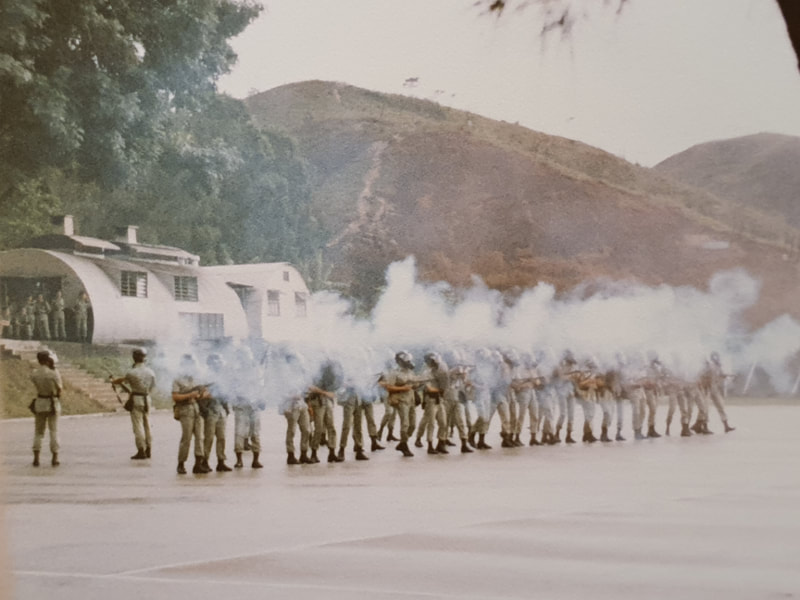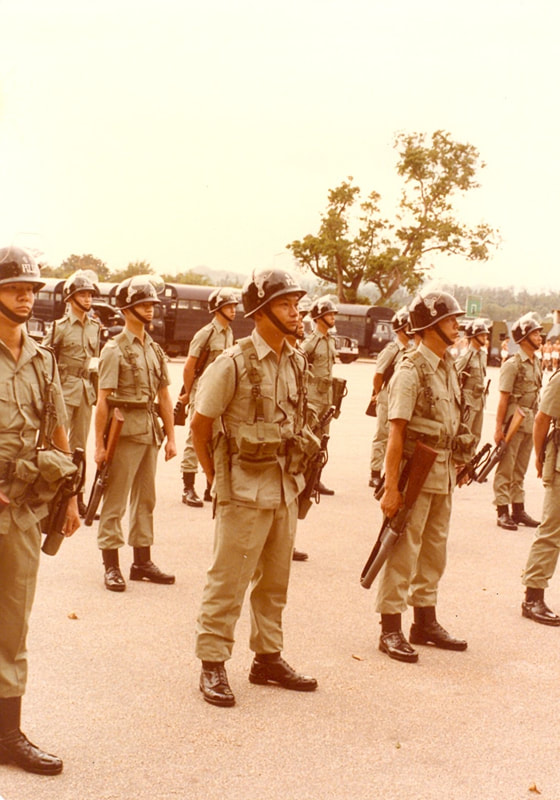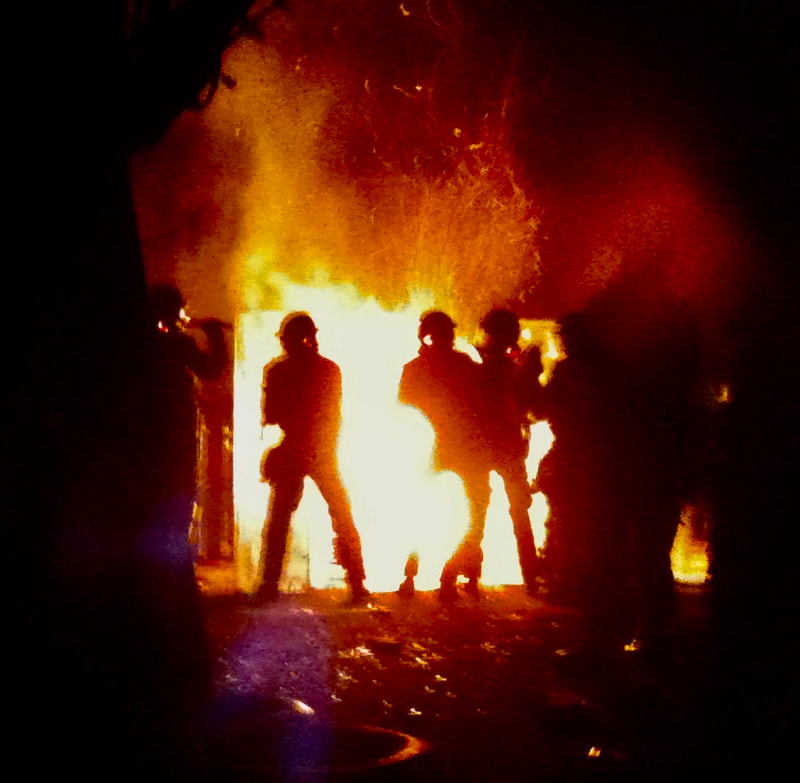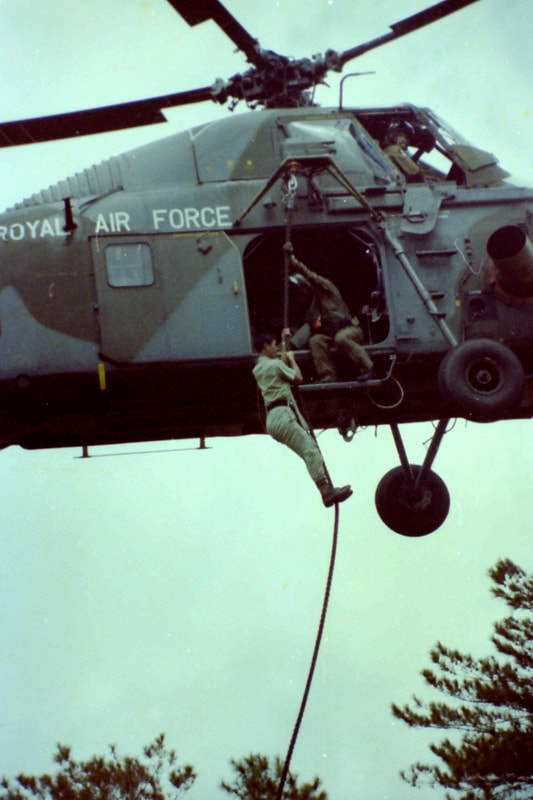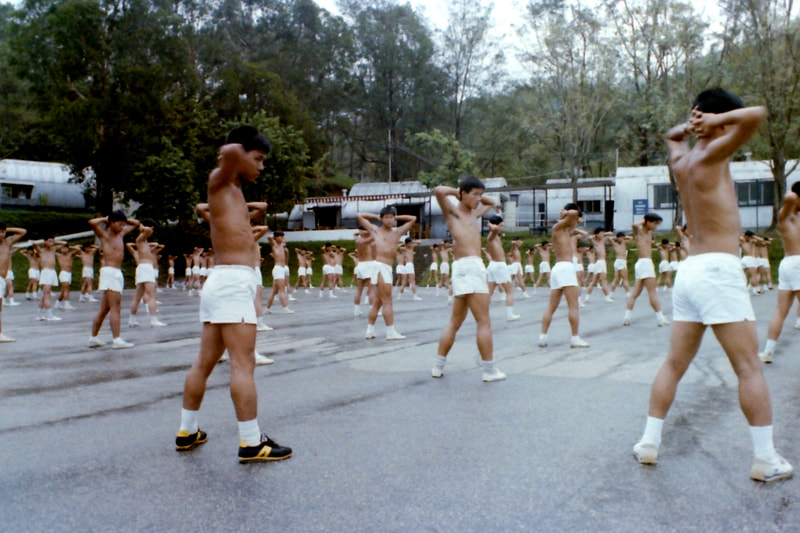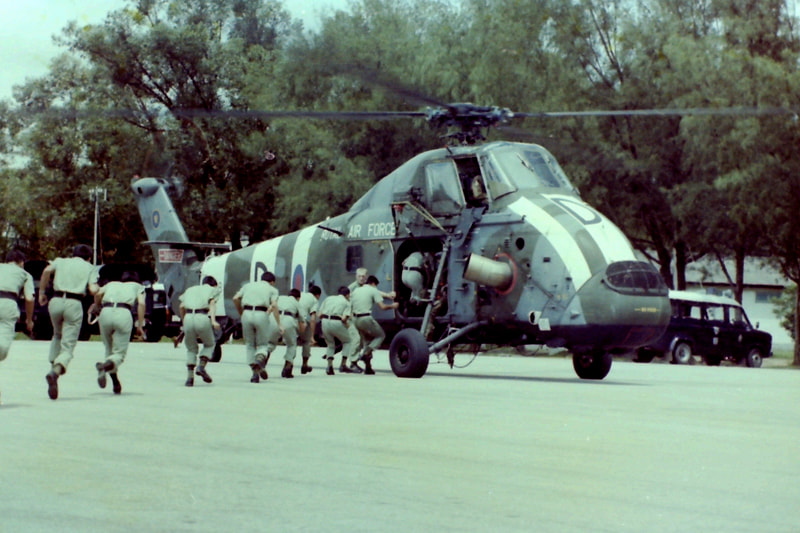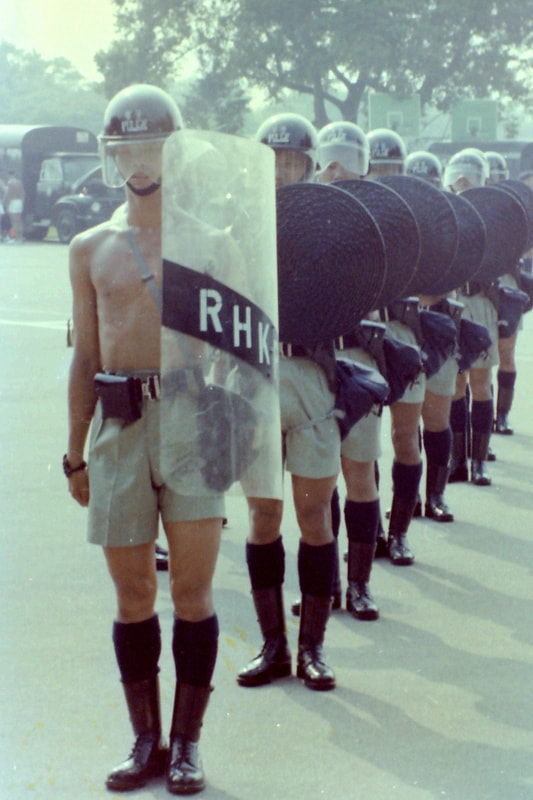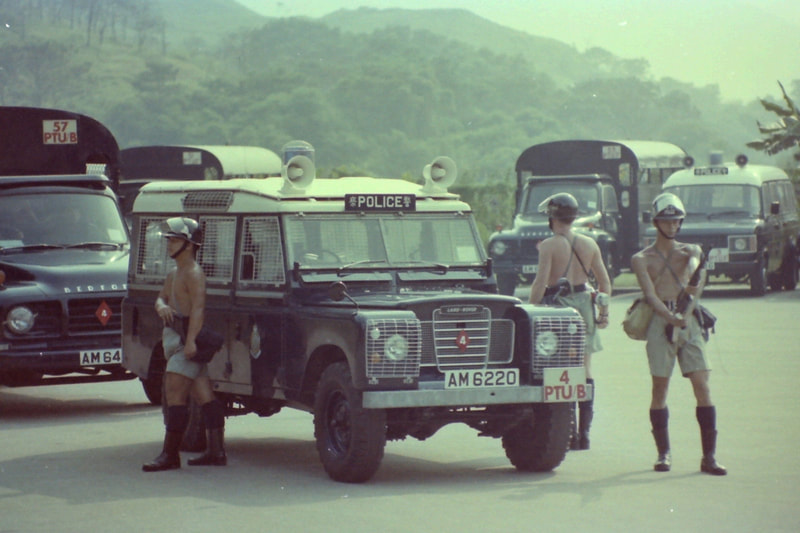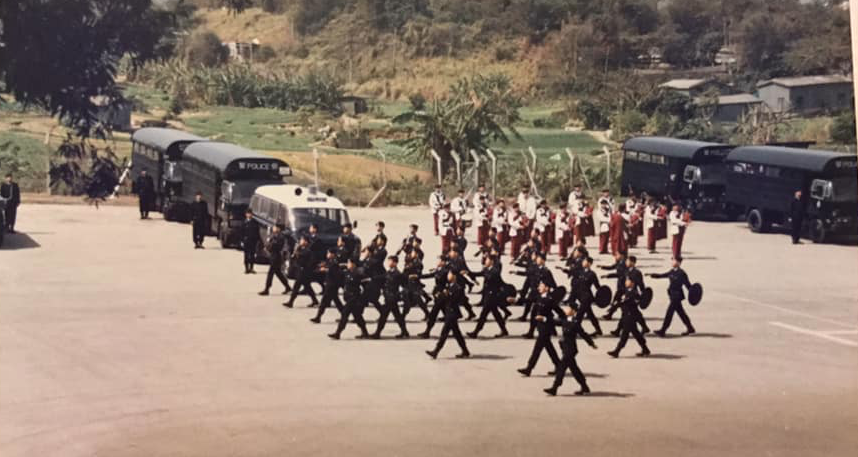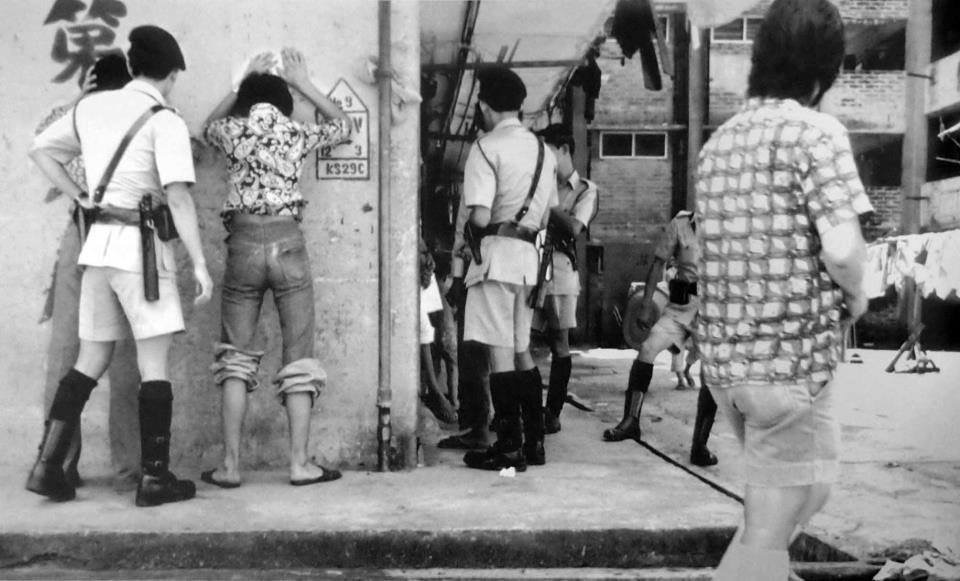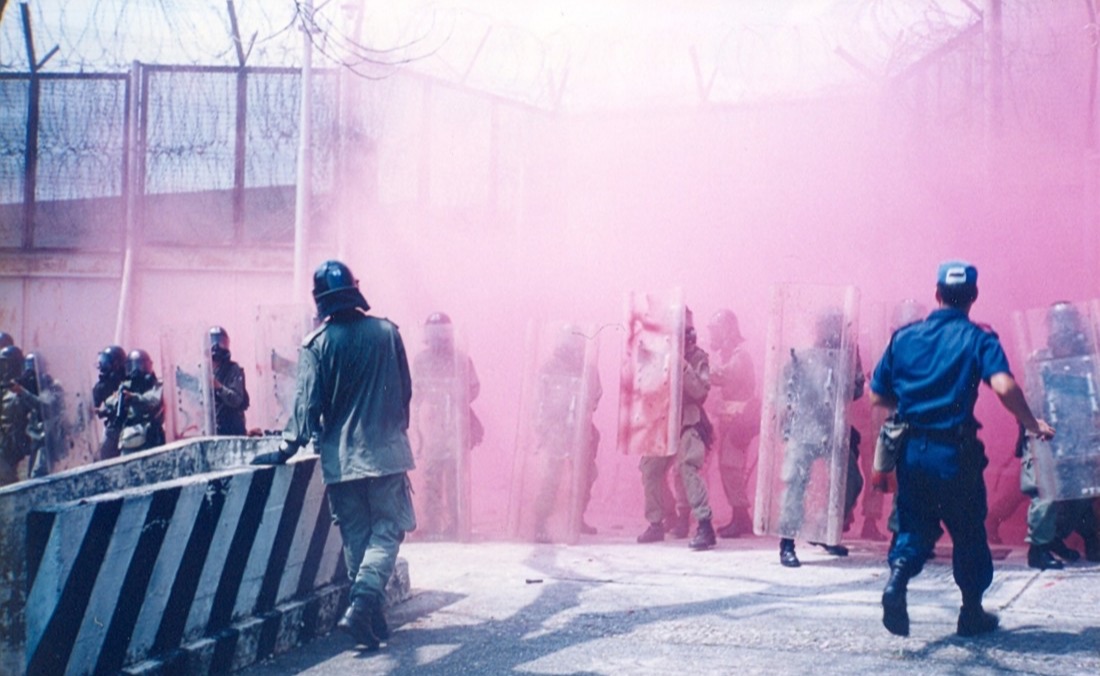Why Tango in Paris, when you can Foxtrot in Kowloon?
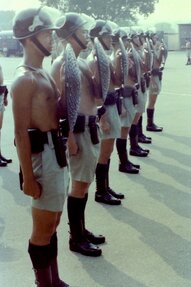 Drill instilled the basics.
Drill instilled the basics.
The PTU or the 'Blue Berets' is the Force's anti-riot unit. Necessity gave birth to the PTU in the late 1950s as civil unrest hit Hong Kong. PTU later morphed into the Commissioner's ready supply of manpower for all challenges. Tackling a crime wave, crowd-control, mass arrest, or supporting counter-terrorist operations all came to the PTU.
In the anti-crime role, PTU is all about flooding an area with cops. We called it 'In-your-face-policing'. Moreover, PTU has a paramilitary flavour, as reflected in training, covering operational planning, ambush techniques, helicopter deployments, cordoning, and search.
There is also an emphasis on fitness. A company, commanded by a superintendent, has four platoons. Assigned to Foxtrot Company, I had joint command of a platoon with 41 officers. Most inspectors attend PTU while young and junior in service.
Commanding the platoon with me was Ray Lok. Ray was older than me. Educated in the United States and Canada, we'd been through the Police Training School together. Working in unison before our subordinates, we'd keep any difference to ourselves. That allowed us to avoid splitting the platoon into two camps.
After a three-week introductory course with the sergeants, the constables arrived. It was then that the pace of training picked up.
PTU training is a full day. The physical exercise was relentless. Meanwhile, the anti-riot manoeuvres got hammered home in strict foot-drill sessions. The junior officers were not expected to think - respond to orders and get it done. That was the ethos.
This regime proved its worth time and time again. For example, under stress during a riot, officers reverted to their training. They use muscle memory to go through weapon loading, aiming and firing—all actions carefully controlled by the platoon commanders.
Nothing had changed done the changes - the Romans did it, drilling and rote actions. Thankfully, everybody got to contribute once we'd mastered the basics.
"Failing to plan is planning to fail" that's the PTU maxim. This axiom came at us with every opportunity. I still use it. It led to clarity of thought, covered continencies and underpinned everything.
If the PTU course wasn't stressful enough, we had an added complication. That of getting Mike Lyne out of bed and up to the base each day. We carpooled driving from Kowloon each morning. Mike needed collecting from the infamous Shangri-La police inspectors house on Waterloos Road. He's supposed to wait outside for us. Except, most days, he's missing.
His 'missing-in-action' routine entailed us getting out of the car and searching the house to find him. Dishevelled, half-conscious and minus his clothes, we'd see him in one room or another. The smell was something else. He'd then be dragged or carried to the car. Then, with his head hanging out the window, we'd set off. Most days, he'd vomit before Tai Po.
Hilarious the first few times, our stretched patience snapped by week two, and we left him. Well, that didn't go down well with the boss. So it's made clear we'd be responsible if he didn't turn up.
So it continued. I take no pleasure in saying that Mike's career ended shortly after our PTU attachment.
The course moved into the tactical phase. PTU staff now tested us in exercises. We planned, briefed, then executed a plan with time pressures on us.
As the saying goes, "no plan survives contact with the enemy." The same applies to police work, as dynamic situations need quick-thinking, constant adjustments.
Superintendent Peter Bolton was the most formidable of the debriefers. He had the delivery of Brian Blessed and not a shred of diplomacy in his body. He'd rip into any commander how'd dithered or shown less than robust planning.
Peter had served in World War II, carrying out missions with partisans in Yugoslavia. He knew his stuff, didn't tolerate fools and was usually spot-on for tactics and command issues. I liked him.
Peter's style did not suit everyone. Company Commanders prickled at Peter's frankness displayed in front of junior staff. Others took exception to this ruthless delivery.
But none questioned his thinking, honesty, nor objectiveness. Then, finally, one brave Superintendent decided to challenge Peter. He asserted that adverse comments made in front of juniors, "Could undermine morale".
Peter's response was swift and brutal, "Morale, morale, you say. Your incompetence is already undermining their morale."
Bit by bit, our leadership skills evolved, usually from failure and setbacks. Finally, moulded by experience, we mastered the process in a constant stream of scenarios, although without finesse.
All this training culminated in a sizeable terrorist exercise—the whole company of 170 officers deployed to "cordon and contain" a hostage incident. At the same time, negotiators sought to open communications. Then, in the shadows, the Special Duties Unit prepared an assault plan.
As part of the inner cordon, I found myself too close to the target building. Face-to-face with a terrorist, a volley of blank rounds had me scrambling away. My cover and move skills improved that day, although I did need a change of underwear.
Mentally and physically, I was well prepared for the role by the end of the PTU training. PTU helped restore my faith in the organisation after an indifferent vice attachment. We had trained for a particular purpose, then undergone testing. I felt confident we could do it. Moreover, do it well.
We next moved to the regional attachment phase operating out of Kwun Tong Police Station in Kowloon East. As the saying goes, why "Tango in Paris when you can Foxtrot in Kowloon?"
"Don't expect too much fun in Kowloon East", cautioned my men.
"It's all crappy factories, housing estates, squatter huts hanging off the hillsides and girls with fat legs."
We soon got down to our job of patrolling, on occasions providing cordons for crime scenes. Nothing much happened. I was quickly bored.
But Yue Man Square in the middle of Kwun Tong soon got my attention. A known hangout for drug addicts, I had no doubt low-level trafficking was underway there. Our duties kept us away from the area, but we passed en-route to the more mundane places. And, of course, as a police officer, if I see a suspected crime, I'm duty-bound to deal with it.
I started small. At shift change-over, I'd take a column of officers (eight) with me to 'respond' to things I'd seen in the square. Our arrival produced the usual scramble to flee by half-conscious addicts. My boys loved this. We were chasing them down through the crowds, seizing the drugs and bringing down the addicts. At first, the hierarchy ignored my incursions in the square. Then, when questioned, I'd claim.
"Sir, we were passing ... I saw this guy handing out what appeared to be drugs. I can't ignore that"
The unimpressed company commander knew my game. He decided to let me run with it for the time being. Then I over-reached. He finally drew the line when I surrounded the square. My whole platoon swept through, searching everyone. That day, we got a good result—several heroin seizures, including a large cache hidden inside a folded umbrella.
"This has got to stop. You're supposed to be patrolling in Sau Mau Ping. So stick to your assigned task."
My partner, Ray, was also less than impressed. A steady, easy-going sort, he was beginning to view me as a reckless young pup. As we shared command of the platoon, he acted to moderate my impetus side.
The tasking in Kowloon East was tedious - walking around housing estates trying to deter burglaries was so tiresome. Also, we got hit with static post duties outside goldsmiths shops. After the PTU training, these roles were a letdown.
One blessing, our stint in Kowloon East was short. Next, the bright lights of Kowloon West beckoned. With Tsim Sha Tsui, Yaumati, Mongkok and Sham Shui Po as our arena for the next six months.
The company moved to Mongkok, right in the heart of Kowloon. This area is one of the busiest and most populated places on the planet. That's more like it.
The tasks assigned to us in Kowloon West provided more latitude for us to be proactive. Soon my platoon was knocking off pickpockets and muggers. A steady haul of illegal immigrants also kept us busy. Finally, I felt I'd found my forte.
In the anti-crime role, PTU is all about flooding an area with cops. We called it 'In-your-face-policing'. Moreover, PTU has a paramilitary flavour, as reflected in training, covering operational planning, ambush techniques, helicopter deployments, cordoning, and search.
There is also an emphasis on fitness. A company, commanded by a superintendent, has four platoons. Assigned to Foxtrot Company, I had joint command of a platoon with 41 officers. Most inspectors attend PTU while young and junior in service.
Commanding the platoon with me was Ray Lok. Ray was older than me. Educated in the United States and Canada, we'd been through the Police Training School together. Working in unison before our subordinates, we'd keep any difference to ourselves. That allowed us to avoid splitting the platoon into two camps.
After a three-week introductory course with the sergeants, the constables arrived. It was then that the pace of training picked up.
PTU training is a full day. The physical exercise was relentless. Meanwhile, the anti-riot manoeuvres got hammered home in strict foot-drill sessions. The junior officers were not expected to think - respond to orders and get it done. That was the ethos.
This regime proved its worth time and time again. For example, under stress during a riot, officers reverted to their training. They use muscle memory to go through weapon loading, aiming and firing—all actions carefully controlled by the platoon commanders.
Nothing had changed done the changes - the Romans did it, drilling and rote actions. Thankfully, everybody got to contribute once we'd mastered the basics.
"Failing to plan is planning to fail" that's the PTU maxim. This axiom came at us with every opportunity. I still use it. It led to clarity of thought, covered continencies and underpinned everything.
If the PTU course wasn't stressful enough, we had an added complication. That of getting Mike Lyne out of bed and up to the base each day. We carpooled driving from Kowloon each morning. Mike needed collecting from the infamous Shangri-La police inspectors house on Waterloos Road. He's supposed to wait outside for us. Except, most days, he's missing.
His 'missing-in-action' routine entailed us getting out of the car and searching the house to find him. Dishevelled, half-conscious and minus his clothes, we'd see him in one room or another. The smell was something else. He'd then be dragged or carried to the car. Then, with his head hanging out the window, we'd set off. Most days, he'd vomit before Tai Po.
Hilarious the first few times, our stretched patience snapped by week two, and we left him. Well, that didn't go down well with the boss. So it's made clear we'd be responsible if he didn't turn up.
So it continued. I take no pleasure in saying that Mike's career ended shortly after our PTU attachment.
The course moved into the tactical phase. PTU staff now tested us in exercises. We planned, briefed, then executed a plan with time pressures on us.
As the saying goes, "no plan survives contact with the enemy." The same applies to police work, as dynamic situations need quick-thinking, constant adjustments.
Superintendent Peter Bolton was the most formidable of the debriefers. He had the delivery of Brian Blessed and not a shred of diplomacy in his body. He'd rip into any commander how'd dithered or shown less than robust planning.
Peter had served in World War II, carrying out missions with partisans in Yugoslavia. He knew his stuff, didn't tolerate fools and was usually spot-on for tactics and command issues. I liked him.
Peter's style did not suit everyone. Company Commanders prickled at Peter's frankness displayed in front of junior staff. Others took exception to this ruthless delivery.
But none questioned his thinking, honesty, nor objectiveness. Then, finally, one brave Superintendent decided to challenge Peter. He asserted that adverse comments made in front of juniors, "Could undermine morale".
Peter's response was swift and brutal, "Morale, morale, you say. Your incompetence is already undermining their morale."
Bit by bit, our leadership skills evolved, usually from failure and setbacks. Finally, moulded by experience, we mastered the process in a constant stream of scenarios, although without finesse.
All this training culminated in a sizeable terrorist exercise—the whole company of 170 officers deployed to "cordon and contain" a hostage incident. At the same time, negotiators sought to open communications. Then, in the shadows, the Special Duties Unit prepared an assault plan.
As part of the inner cordon, I found myself too close to the target building. Face-to-face with a terrorist, a volley of blank rounds had me scrambling away. My cover and move skills improved that day, although I did need a change of underwear.
Mentally and physically, I was well prepared for the role by the end of the PTU training. PTU helped restore my faith in the organisation after an indifferent vice attachment. We had trained for a particular purpose, then undergone testing. I felt confident we could do it. Moreover, do it well.
We next moved to the regional attachment phase operating out of Kwun Tong Police Station in Kowloon East. As the saying goes, why "Tango in Paris when you can Foxtrot in Kowloon?"
"Don't expect too much fun in Kowloon East", cautioned my men.
"It's all crappy factories, housing estates, squatter huts hanging off the hillsides and girls with fat legs."
We soon got down to our job of patrolling, on occasions providing cordons for crime scenes. Nothing much happened. I was quickly bored.
But Yue Man Square in the middle of Kwun Tong soon got my attention. A known hangout for drug addicts, I had no doubt low-level trafficking was underway there. Our duties kept us away from the area, but we passed en-route to the more mundane places. And, of course, as a police officer, if I see a suspected crime, I'm duty-bound to deal with it.
I started small. At shift change-over, I'd take a column of officers (eight) with me to 'respond' to things I'd seen in the square. Our arrival produced the usual scramble to flee by half-conscious addicts. My boys loved this. We were chasing them down through the crowds, seizing the drugs and bringing down the addicts. At first, the hierarchy ignored my incursions in the square. Then, when questioned, I'd claim.
"Sir, we were passing ... I saw this guy handing out what appeared to be drugs. I can't ignore that"
The unimpressed company commander knew my game. He decided to let me run with it for the time being. Then I over-reached. He finally drew the line when I surrounded the square. My whole platoon swept through, searching everyone. That day, we got a good result—several heroin seizures, including a large cache hidden inside a folded umbrella.
"This has got to stop. You're supposed to be patrolling in Sau Mau Ping. So stick to your assigned task."
My partner, Ray, was also less than impressed. A steady, easy-going sort, he was beginning to view me as a reckless young pup. As we shared command of the platoon, he acted to moderate my impetus side.
The tasking in Kowloon East was tedious - walking around housing estates trying to deter burglaries was so tiresome. Also, we got hit with static post duties outside goldsmiths shops. After the PTU training, these roles were a letdown.
One blessing, our stint in Kowloon East was short. Next, the bright lights of Kowloon West beckoned. With Tsim Sha Tsui, Yaumati, Mongkok and Sham Shui Po as our arena for the next six months.
The company moved to Mongkok, right in the heart of Kowloon. This area is one of the busiest and most populated places on the planet. That's more like it.
The tasks assigned to us in Kowloon West provided more latitude for us to be proactive. Soon my platoon was knocking off pickpockets and muggers. A steady haul of illegal immigrants also kept us busy. Finally, I felt I'd found my forte.
Copyright © 2015
